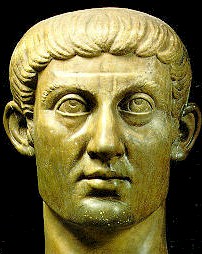October 28: Constantine the Christian
Constantine the Great (312 CE)
It was on this date, October 28, 312 CE, that Roman emperor Constantine the Great, aged 32, is said to have conquered in the sign of the Christian faith. After seeing a vision of the Chi-Ro [ΧΡ] — indicating "Christ," his priestly advisors gleefully told him — he crossed the Milvian bridge with a labarum bearing the sign and won the battle. And so his supremacy over the legally divided Roman Empire was won.
The story of the miraculous sign is related by "the father of ecclesiastical history," Eusebius, bishop of Caesarea, but it is not to be found in his Ecclesiastical History, which he wrote while Constantine was alive. Instead, Eusebius tells the tale after the Emperor is safely in his grave.
Constantine was the natural son of a rural tavern girl and a Roman officer. He advanced to the throne through rivers of blood, with more to come. That he established a new capitol in Constantinople was an expedient based on practicality: he had been driven from Rome because, in a fit of jealousy, he had ordered the murder of his wife, a son, and a juvenile nephew.
If he was a Christian, before his deathbed baptism, it is hard to tell: he carried pagan offices and titles throughout his life and after his death his successor and son Constantius...
...slew his uncles and his cousins. He had no mercy on the father-in-law whose daughter he had married, or on his relatives in their affliction. He treated his brother infamously...*
...according to the orthodox Christian and contemporary, Athanasius. The Empire was secured for the Christian cult to expand and grow, its supremacy assured by decrees shutting out competition, plus generous donations of state money and property. Thus did Christianity triumph — not by persuasion but by coercion. Within a century the state-supported Church was wealthy, corpulent and corrupt.
* St. Athanasius (Doctor of the Church, c.296-373) wrote of the Emperor's son, Constantius, in his History of the Arians, ch. 69,
What wonder that he should rage against the bishops seeing that in the treatment of his relatives he showed himself devoid of the common feelings of humanity. He slew his uncles and his cousins. He had no mercy on the father-in-law whose daughter he had married, or on his relatives in their affliction. He treated his brother infamously, and he now announces that he is building a sepulchre for him, and he delivered his wife to the barbarians.
In other words, as Joseph McCabe writes, "in order to secure the division of the Empire between the three sons of Constantine, nearly all the other male relatives (two uncles, seven cousins, and their supporters) were murdered in the imperial palace." (A Testament of Christian Civilization, 1946, p. 13)
Originally published October 2003 by Ronald Bruce Meyer.


